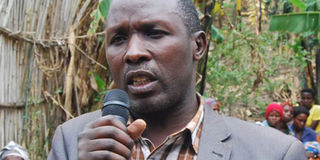Government lacks political will to improve district funding, say local leaders

- “We get about Shs7 billion a year. This is just a token; for example, we only get Shs390 million for roads to cater for everything, including engineers’ allowances. What is even more disappointing is that we are not collecting any taxes; URA is covering all taxable sources local government would have exploited,”
What you need to know:
- Justification. Local government officials attribute this to the decreasing funding to districts every year.
Mbarara.
Leaders from western region have expressed concern over the “diminishing” funding to local governments and inadequate sources of local revenue.
The leaders, who attended the African Peer Review Mechanism (APRM) consultations in Mbarara District on Monday, observed that if government is not put under pressure to improve funding to local governments, service delivery will continue to suffer.
“Local governments are supposed to be financed with 30 per cent of the national budget but this has never been possible; sometimes it is as low as 15 per cent. This continues to stifle service delivery,” said Mr Cuthbert Felix Esoku, the Mbarara District chief administrative officer.
After adopting the decentralisation policy in 1993 and fiscal decentralisation in 2003, there were high hopes that service delivery at the grassroots would improve.
However, leaders said there is lack of political will to fund local governments, leaving them to suffer.
Mr Elly Muhwezi, a member of Ankole Civil Society Forum, argued that inadequate funding to local governments is not only about lack of resources.
“It is not to say that money is lacking, see what is being splashed out for age limit amendment. The only challenge we have is lack of political will to better lives of the common person,” said Mr Muhwezi.
“Even if government revenue is enhanced, with the current corruption there will be no guarantee for effective service delivery,” he added.
The chairperson of the Uganda Local Governments Association (ULGA), Mr Godfrey Mutabazi, said the decentralisation policy in Uganda is theoretical and that local governments only stop at making budgets.
“All big projects are managed by the centre; Community Agriculture Infrastructure Improvement Programme, Naads, Operation Wealth Creation and others. For example for Operation Wealth Creation, they send us seedlings, which are fake and cannot benefit communities. Why can’t these projects be managed locally and the centre does the monitoring?” said Mr Mutabaazi.
Mr Moses Mwesige from Kyenjojo NGO Forum said it is very unfortunate that whereas the ordinary citizens bear a heavy tax burden, the quality of social services in schools, hospitals, water and roads have remained poor.
“Poverty levels at the grass root are very high, production has declined, people cannot send their children to school, some sleep hungry. People are not seeing the good in paying taxes,” said Mr Mwesige.
Mr Baker Akampurira from Rubirizi District argued that if the central government is committed to promoting the decentralisation policy, it should commit at least 40 per cent funding to the local governments.
Mr Mutabazi said: “We used to be funded at 48 per cent but we are now funded at 10 per cent of the national budget. With this funding, how you expect us to deliver services effectively. Limited and ever decreasing funding from the centre is major reason for poor service delivery in local governments,” Mr Mutabazi said.
According to the 2017 APRM preliminary findings, the central government continues to create more districts which only spread political representation but with limited staffing and financing.
Call for graduated tax
Mbarara District chairperson Bamuturaki Tumusiime called for reinstatement of graduated tax.
“For example, if graduated tax was reinstated, we would ensure we get 98 per cent of this money. Local people are demanding for services but we cannot manage because of limited funding. We need to look alternative sources of funding,” said Capt (Rtd) Bamuturaki.
The APRM report recommends that the National Local Economic Development Policy be fully implemented to support local governments identify own investment opportunities that can generate revenue, create employment and make them less dependent on the central government.
Bishop Dinis Salomao Sengulane, a team leader of the APRM, said the consultations were aimed at confirming whether what is contained in their report is the reflection of what is on the ground.
“The findings and views collected will be put in the final national report to be handed to head of state for implementation,” said Bishop Sengulane.



